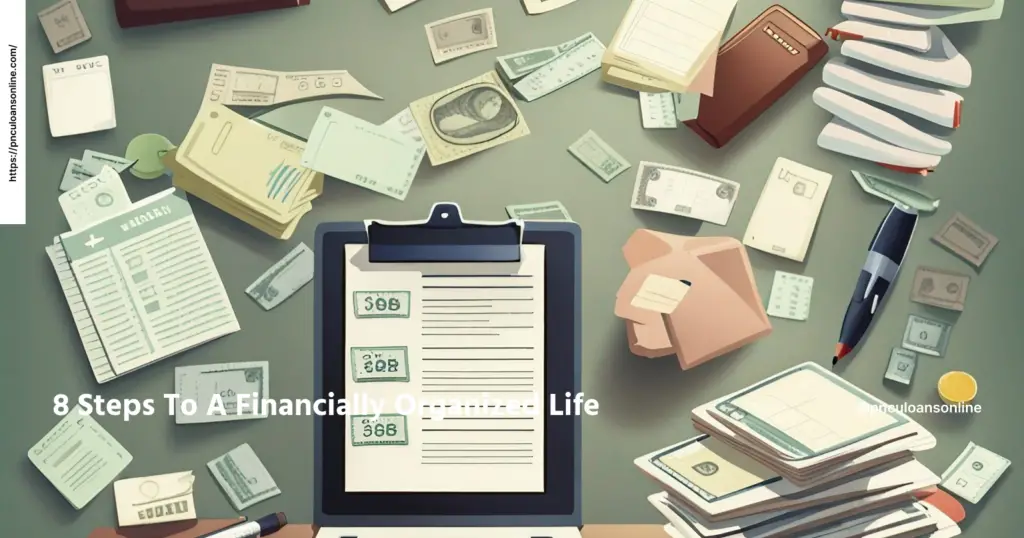Welcome to your path toward stability and organization in your finances! It’s essential to efficiently manage our funds in the fast-paced environment we live in today. This article will walk you through eight doable steps to help you live a financially ordered life, whether you’re starting from scratch or trying to improve your financial habits. You can take charge of your finances, lessen stress, and work toward a better financial future by putting these strategies into practice. Let’s start now!
Evaluate Your Financial Situation Currently
The first step in arranging your finances is to have a clear understanding of your present financial situation. Determine your net worth first, which is the sum of your assets (such as cash, investments, and real estate) and liabilities (such as debts and loans). To find areas where you may improve, evaluate your monthly budget, expenses, and revenue. This evaluation will provide you a clear view of your financial situation and assist you in setting achievable goals.
Set financial goals
To organize your life, set attainable financial goals that are clear and specific. Establish goals that are in line with your long-term and short-term aims. Long-term objectives can be saving for retirement or purchasing a home, while short-term objectives might be starting an emergency fund or paying off credit card debt. To help you stay on track, keep in mind that your goals should be SMART (specific, measurable, achievable, relevant, and time-bound).

Establish a Budget
A budget is an effective tool that gives you financial control. To find out where your money is going, start by keeping track of your income and expenses. To better understand your spending habits, divide your expenses into essential (such as housing, food, and utilities) and discretionary (such as entertainment and eating out) categories. Set reasonable spending caps for every category and try to set aside some of your money. Review and modify your budget on a regular basis to account for changes in your financial status.
Manage your credit and debt
Strategic debt management is essential because it can obstruct your ability to advance financially. Pay off credit card bills and other loans with high interest rates first. Examine your choices for lowering interest rates and streamlining payments, such as debt consolidation or balance transfers. Additionally, maintain responsible credit management by paying payments on time, minimizing credit card balances, and routinely checking your credit report. Controlling your debt will free up funds for other financial objectives.
Create a Reserve Fund
An emergency fund can act as a safety net in trying times because life is full of unforeseen surprises. Save enough money in a separate account to cover your living expenditures for three to six months. Set away a small amount initially from each paycheck as a donation, then gradually raise it. In the event of unanticipated situations, having an emergency fund will provide you peace of mind and prevent financial disasters.
Use Your Money Savvily
An orderly financial life must include both saving and investing. Focus on saving for your future goals once you’ve established your emergency fund. Open a retirement account, like a 401(k) or an IRA, and make regular contributions. Examine additional investing choices, such as stocks, bonds, or mutual funds, in accordance with your risk tolerance and financial goals. Always keep in mind that investing is a long-term endeavor, and that beginning early can have a big impact on your future financial stability.
Automate Your Finances
Your financial life can be made simpler by automation, which also helps you stay on track with your objectives. Establish automatic transfers to your retirement, investment, and savings accounts. Set up automated payments for your bills to prevent late fees and raise your credit score. Your budgeting, cost tracking, and goal monitoring can be streamlined by utilizing technology and financial apps. You’ll save time, lower the possibility of human error, and maintain organization with ease if you automate your finances.
Seek Advice from a Professional
Never be reluctant to seek professional advice when in doubt or when faced with difficult financial choices. A financial advisor or a professional planner can provide you with individualized counsel catered to your particular situation. They can assist you with retirement planning, tax planning, and through significant life events like home purchases and family formation. You can make wise financial decisions if you have the knowledge and assurance that comes from professional competence.
Develop Sound Financial Practices
Long-term financial organization requires developing sound financial habits in addition to the earlier outlined practical procedures. Let’s look at several practices that might keep your finances stable:
Regularly Keep Track of Your Expenses
Regularly tracking your expenses is one of the best methods to keep your finances in order. Keep track of every dollar you spend, whether it’s on a cup of coffee or a significant acquisition. You can find areas where you might be overspending by looking through your costs and then make the necessary modifications to your budget. You can become more aware of your spending patterns and make wiser financial decisions by keeping track of your expenses.
Give Savings Priority
When trying to get your finances in order, saving money should come first. Consider saving as a cost that cannot be changed in your budget. Make it a habit to continuously save money by setting aside a portion of your monthly salary. By setting up automatic transfers to a different savings account, you could want to automate your savings. By prioritizing saving, you’ll create a safety net for the future and be better equipped to handle unforeseen costs or opportunities.
Practice Deferred Reward
In a culture that values rapid satisfaction, learning to wait gratification has a big financial payoff. Take the time to consider if a purchase is in line with your financial goals and priorities rather than giving in to impulse buys. Give yourself some time to think things through before making any significant purchases. This practice not only aids in saving money but also teaches you to value long-term financial security over momentary enjoyment.
Gain Personal Finance Knowledge
When it comes to efficiently managing your finances, knowledge is power. Decide to educate yourself on personal economic issues including retirement planning, investing, and budgeting. Attend seminars or workshops, read books, follow credible financial blogs, and listen to podcasts. The more you comprehend personal finance fundamentals, the more prepared you’ll be to make wise choices and effectively handle challenging financial situations.
Surround Yourself With Resources
Your financial journey can be dramatically impacted by developing a solid support network. Find people who are on the same page with you in terms of your financial organization goals and beliefs. Hold each other accountable, engage in debates about money management, and share advice and tactics. Consider participating in local meetups or online communities dedicated to personal finance. It can be motivating and insightful to be around individuals who encourage and support your financial goals.
Remain inspired and commemorate achievements
Continuous motivation is needed to maintain long-term financial organization. No matter how minor they may seem, remember to celebrate your progress along the way. Recognize your accomplishments, whether they involve paying off a credit card, achieving a savings target, or following your budget for a sustained period of time. You may maintain your motivation and dedication to your financial goals by rewarding yourself for your effort and advancement.

Regularly Review and Adjust
Financial organization involves ongoing examination and modification. It is not a one-time project. Set aside time every few months to examine your accomplishments, revise your spending plan, and reevaluate your objectives. Your financial priorities may alter as your life circumstances change. You can make sure that your financial plan is still in line with your goals and circumstances by frequently assessing and making adjustments to it.
Conclusion:
Congratulations for beginning the process of living a financially responsible life! You may acquire control over your finances and create a secure future by adhering to these eight measures. Keep in mind that maintaining financial order is a continuous process that calls for commitment, discipline, and sporadic modifications. Accept the road and recognize your accomplishments as you go. Maintain your focus, push through obstacles, and constantly bear in mind the long-term advantages of living a financially ordered life. You have the ability to provide yourself and your loved ones a better financial future. starting now!
FAQs:
The first question is: How long does it take to organize finances?
Each person has a different schedule for reaching financial organization. It relies on elements including your level of dedication, the complexity of your ambitions, and your existing financial status. Within a few months, you can start to notice progress with constant effort and dedication. It may take several years to achieve comprehensive financial structure, but this process is still continuous.
Can I organize my finances even with a meager income?
Absolutely! Your level of financial organization is not only based on your income. It involves handling your finances wisely and making informed financial decisions. No matter how much money you make, you can still set a budget, prioritize your expenses, and save. Look for alternatives for work advancement or side businesses to boost your income. No matter your income, financial organization is attainable for everyone.
What if I owe a lot of money? Is it still possible for me to organize my finances?
Yes, it is still possible to organize your finances even if you have a large amount of debt. In fact, getting your finances in order can make it easier for you to pay off your debt. Create a budget that enables you to set aside some of your money for debt repayment to get started. Prioritize high-interest obligations and take into account balance transfers or debt consolidation to lower interest rates. You can take steps to get out of debt and get your finances in order by developing sound financial practices and managing your debt aggressively.
Is consulting a professional important for financial organization?
While getting expert assistance is not required, it may be quite helpful, particularly if you are in a complicated financial situation or are lacking in specific information. Certified planners or financial consultants can offer professional advice catered to your unique circumstances. They can give you investment advice, support retirement planning, and help you create a thorough financial strategy. However, you can attain financial organization on your own with self-education and perseverance.
How can I maintain motivation while organizing my finances?
might be difficult, but there are methods to keep you on course:
Specify your objectives and consider the advantages of accomplishing them.
Your objectives should be broken down into smaller milestones, and each one should be honored.
Find a support system by joining a group of like-minded people or an accountability partner.
Recall the factors that make financial organization important to you.
Learn about personal money so you can stay educated and motivated.
Track your development frequently to gauge your success.
When necessary, take a break, and treat yourself for your hard effort.

